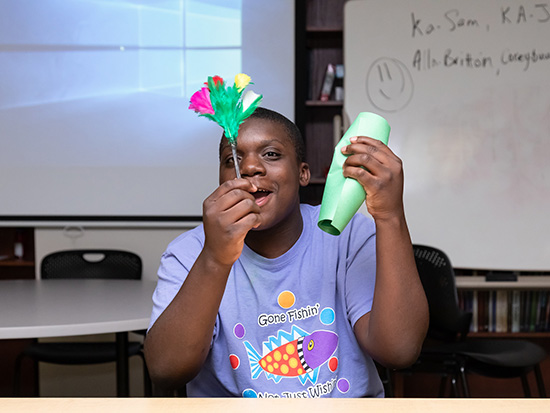 Student Armar "AJ" Wagner in UAB Magic Camp uses both of his hands to do a magic trick.Researchers at the University of Alabama at Birmingham are studying how a magic arts training program can specifically benefit adolescents with unilateral cerebral palsy, which affects movement and muscle tone on one side of the body. The research will be done through a virtual magic camp program, a collaboration between UAB Arts in Medicine, the UAB School of Health Professions’ Department of Occupational Therapy and Hocus Focus Creative Learning Through the Arts, created and led by illusionist and educator Kevin Spencer, Ph.D. The National Endowment for the Arts has awarded UAB Arts in Medicine an $80,000 research grant for this study.
Student Armar "AJ" Wagner in UAB Magic Camp uses both of his hands to do a magic trick.Researchers at the University of Alabama at Birmingham are studying how a magic arts training program can specifically benefit adolescents with unilateral cerebral palsy, which affects movement and muscle tone on one side of the body. The research will be done through a virtual magic camp program, a collaboration between UAB Arts in Medicine, the UAB School of Health Professions’ Department of Occupational Therapy and Hocus Focus Creative Learning Through the Arts, created and led by illusionist and educator Kevin Spencer, Ph.D. The National Endowment for the Arts has awarded UAB Arts in Medicine an $80,000 research grant for this study.
Magic, or illusion, is a performing art using staged tricks or illusions of seemingly impossible feats using natural means intended to entertain audiences. It is an often-misunderstood contemporary art form, a type of theater that uses elements of drama, improvisation, movement, creative writing and presentation.
Adolescents with unilateral cerebral palsy face daily challenges associated with motor impairment, and increased social and emotional difficulties that can lead to mental health problems. Participation in a structured magic arts training program can help, says School of Health Professions Professor and Director of Research Hon Yuen, OTR/L, Ph.D., who also works with Arts in Medicine.
The magic arts training program can help adolescents with UCP improve in motor and social-emotional function. Magic tricks that require the children to hold and manipulate objects when they perform can be taught. As children practice, they repetitively engage in meaningful motor tasks with two hands, which leads to improvements in the more affected limb and in bimanual motor function. This success improves their confidence and motivation to use their affected limb for activities that require two hands.
“While learning magic arts in a group setting, the learner not only acquires motor control but also engages in appropriate social interactions with peers while developing the skills and attitudes necessary to understand and manage emotions,” Yuen said. “Therefore, learning magic arts can promote both motor control and social-emotional development.”
UAB Arts in Medicine will evaluate the benefits to adolescents participating in a six-week virtual magic arts training program by measuring the extent to which they use two hands in activities and improve their social-emotional skills.
The UAB Arts in Medicine and School of Health Professions’ collaboration with Spencer began in 2018. They have published two studies that showed the effectiveness of a virtual summer magic camp program in enhancing motor control in children and adolescents with UCP, and self-esteem and social skills in children and adolescents with attention-deficit/hyperactivity disorder and autism spectrum disorder.
UAB hosts annual UAB Virtual Magic Camps each summer. UAB occupational therapy students are trained in the protocol developed by Spencer — an international authority on the therapeutic use of magic tricks in physical and psycho-social rehabilitation — and provide instruction to the campers. Each camper is paired with two OT students for the duration of the three-week summer camp.
Through this pairing, campers work at their own speed and have a personalized learning experience. The end of each camp features a streamed magic show performance for friends and family. Camp is free and open to children ages 9-18 who have been diagnosed with a disability. The virtual camp welcomes participants from all over the United States and internationally. Learn more at uab.edu/shp/ot/ot-magic-camp.
UAB Arts in Medicine, a collaboration with UAB Medicine, strives to enhance healing and wellness for patients, families, staff and communities through arts and creativity. AIM was founded on evidence-informed practice and is part of a whole-person approach to health care that focuses on the mind, body and spirit of patients and caregivers.